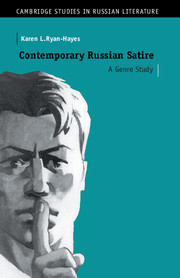Book contents
- Frontmatter
- Contents
- Acknowledgments
- Note on the translation
- Introduction
- 1 Iskander's transparent allegory: Rabbits and Boa Constrictors
- 2 Beyond picaresque: Erofeev's Moscow–Petushki
- 3 Satire and the autobiographical mode: Limonov's It's Me, Eddie
- 4 The family chronicle revisited: Dovlatov's Ours
- 5 Dystopia redux: Voinovich and Moscow 2042
- Conclusion
- Notes
- Select bibliography
- Index
- CAMBRIDGE STUDIES IN RUSSIAN LITERATURE
2 - Beyond picaresque: Erofeev's Moscow–Petushki
Published online by Cambridge University Press: 10 September 2009
- Frontmatter
- Contents
- Acknowledgments
- Note on the translation
- Introduction
- 1 Iskander's transparent allegory: Rabbits and Boa Constrictors
- 2 Beyond picaresque: Erofeev's Moscow–Petushki
- 3 Satire and the autobiographical mode: Limonov's It's Me, Eddie
- 4 The family chronicle revisited: Dovlatov's Ours
- 5 Dystopia redux: Voinovich and Moscow 2042
- Conclusion
- Notes
- Select bibliography
- Index
- CAMBRIDGE STUDIES IN RUSSIAN LITERATURE
Summary
Oh, the ephemeral. Oh, vanity. Oh, that most infamous and shameful of times in the life of my people — the time from the closing of the liquor stores until dawn!
Venedikt Erofeev: Moscow—PetushkiPrior to glasnost′, Venedikt Erofeev was known only to a limited circle of cognoscenti as the mysterious author of the samizdat work Moscow—Petushki. Very little information was available about him and his biography was the stuff of rumor and hearsay. With glasnost′, numerous publications devoted to Erofeev and to his works have appeared and the background of Moscow—Petushki can be reliably reconstructed. Erofeev was born in 1938 in Zapoliar′e, in the Murmansk region. He grew up and received his primary education in Kirovsk, a city on the Kol′skii Peninsula north of the Arctic Circle. His sister recalls that even as a young child he resisted conforming to Soviet social norms, refusing to become a Young Pioneer or a member of the Komsomol. In 1946, his father was arrested under the infamous Article 58 (dissemination of anti-Soviet propaganda), and both Venedikt and his brother were put in a children's home in Kirovsk, where they remained until his father's release in 1954. After completing the tenth grade with a gold medal for academic excellence, Erofeev crossed the Arctic Circle for the first time — like his eminent predecessor Lomonosov — on his way to Moscow.
- Type
- Chapter
- Information
- Contemporary Russian SatireA Genre Study, pp. 58 - 100Publisher: Cambridge University PressPrint publication year: 1996

